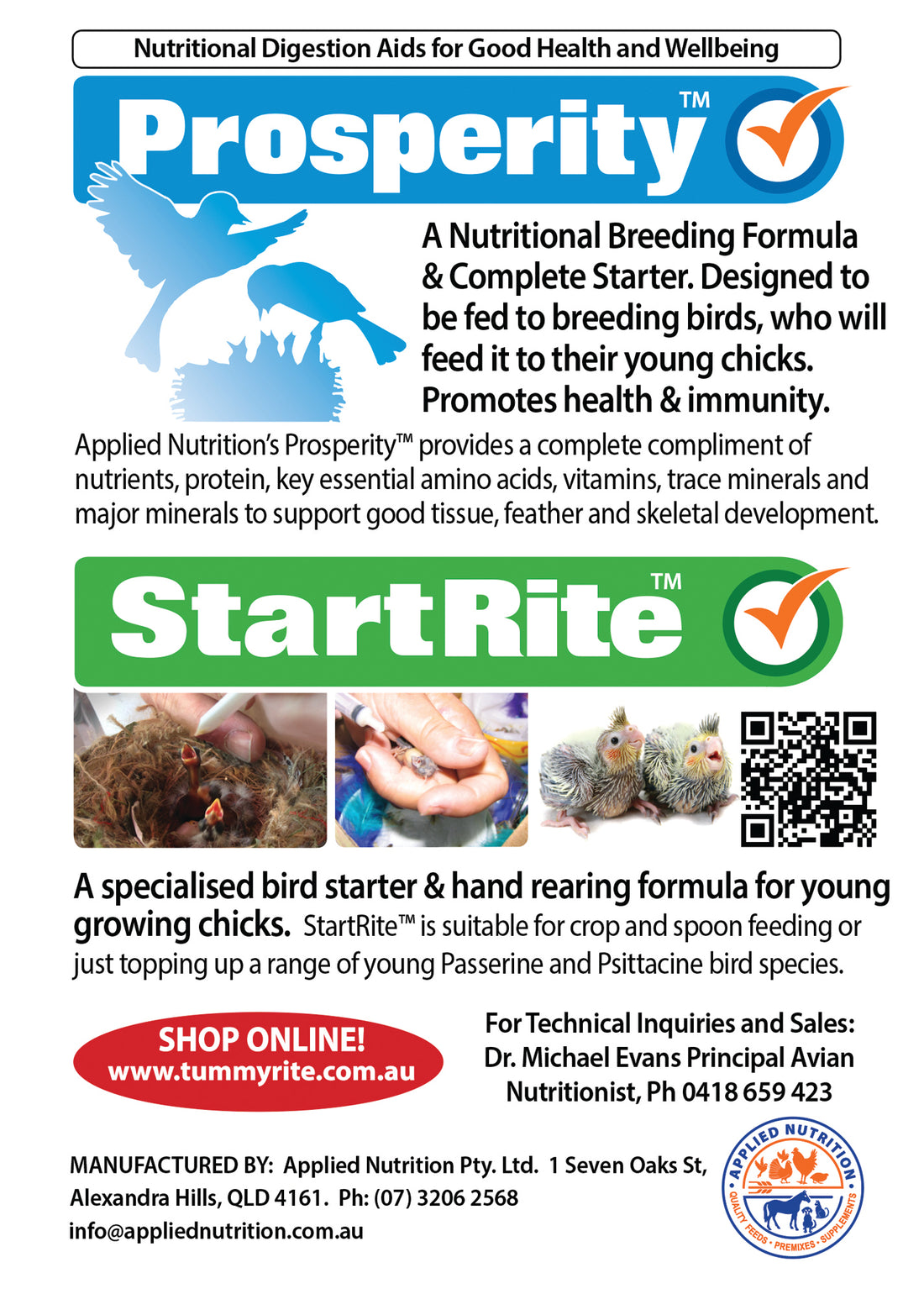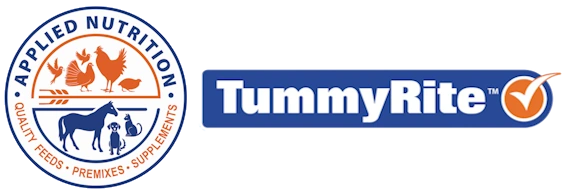
BREEDING SEASON - THE IMPORTANCE OF HIGH-QUALITY BALANCED PROTEIN DIETS FOR YOUNG GROWING BIRDS
It is now August and for many species of birds, the breeding season is upon us.The feeding of captive birds is about maintenance, health, growth and reproduction. Malnutrition, underfeeding and overfeeding, are two of the most common health issues found in captive birds. In this article, with the onset of the breeding season, I am going to focus on the nutrition of young birds. In the case of young growing birds, underfeeding, particularly of unbalanced diets, is common. Incorrect supplementation with nutritionally inadequate soft foods is often the cause of underfeeding and results in stunted growth and poor feathering. Several soft-foods I have seen in practice are no more than fillers and lack the critical nutrients, in particular, essential amino acids and other critical nutrients. These essential amino acids are vital for body tissue and feather growth and development. The need for minerals, particularly calcium and phosphorus, is necessary for skeletal development. Phosphorus is abundant in grain, but this is usually bound in an unavailable form known as phytate phosphorus. With the use of phytase enzymes, this phosphorus is released and made available to the bird. Calcium, on the other hand, is deficient in most of the foods we give to our passerine and psittacine birds and therefore needs supplementing in the diet. Tissues (muscles) build on this skeletal framework as a supporting structure.
Young growing birds need significant nourishment to develop properly and grow. In particular, altricial (Passeriformes and Psittacidae) birds do grow extremely fast compared to the fastest-growing meat chicken (Megapodiidae). These birds are at each end of the Altricial-Precocial Spectrum. Vital nutrients, in adequate amounts, are needed to support this fast growth. The table below shows that budgerigars mature at least six times the rate of meat chickens and eight and a half times the rate of growing layer pullets.
The following table shows a comparison of maturation rates of some common birds kept in captivity:
|
Species |
Maturation Rate |
Mature Body Weight |
|
Budgerigar (show) |
0.210 |
50.0 to 60.0 g |
|
Canary |
0.300 |
15 to 20 g |
|
Finch |
0.260 |
16 to 27 g |
|
Pigeon |
0.220 |
400 to 500 g |
|
Meat Chicken |
0.036 |
5,000.0 to 6,000 g |
|
Growing Layer Pullet |
0.025 |
1,800 to 2,200 g |
Captive birds are solely reliant on us to provide them with the necessary nutrients, particularly protein, amino acids and minerals, such as calcium and phosphorus, to grow tissues, skeleton and feathers. Grains and insects alone cannot provide all the necessary nutrients to support the growth and development of young birds in captivity.
From our modelling of tissue, feather and skeletal growth in birds for the first 14 critical days of growth, I have been able to establish the daily amino acids, calcium and phosphorus requirements for these fast-growing birds. Since the maturation rate in Passerine and Psitticine species are very similar, the development of products to meet these daily requirements is straightforward and incorporated into a product suitable for both groups of birds. There is some variation in the values I have calculated for nutrient requirements, but they work very well in practice. Field observations, over several years, have seen a significant increase in survivability, growth rate and feather quality. Also, the selection of appropriate ingredients included in these bird starter products is critical to ensure the maximum digestibility for the young developing gastrointestinal tract.
There are two products that I have developed for young, growing birds. The first product is Prosperity™ designed for breeding birds, which, in turn, feed this food to their chicks. The second product is StartRite™, a hand-rearing formula which contains fine, highly digestible feed ingredients to ensure ease of use for crop needle and spoon-feeding administration. Both products include a complete range of nutrients, including protein, critical essential amino acids, vitamins, trace minerals and major minerals and are full foods for growing chicks.
Also, Prosperity™ and StartRite™ contain TummyRite™ components that aid the bird to develop its natural immunity to disease challenges and to digest major feed components. These include the herb extracts, functional fibres, some of which are anti-microbial. Prebiotics added to encourage the growth of favourable bacteria (lactobacillus, bifidobacteria).
The protein in Prosperity™ and StartRite™ is pre-digested, but not a denatured protein, which ensures the protein is more bio-available to the bird, resulting in improved nutrient absorption.
The pre-digested process reduces allergenic reactions in birds by removing the allergenic protein components, β-conglycinin, glycinin and lectins that are responsible for these allergenic reactions.
Prosperity™ and StartRite™ contain lactic acid generated naturally through the fermentation process leading to a product of low pH and excellent palatability. The product stimulates high feed intake and assists favourable gastrointestinal microflora in increasing and therefore assisting to reduce the pathogenic bacteria challenges in the gut. The use of enzymes in Prosperity™ and StartRite™ acts to improve digestion of the primary feed ingredients, releasing phosphorus from phytate in grains, helping to reduce excessive gaseous emissions and reducing the impact of the feed on the environment.
Amino acids are the essential building blocks of protein. During the production of body tissues, feathers and eggs, birds require the correct amount and balance of amino acids in their feed for them to do this efficiently, to minimise waste and optimise growth and development. Prosperity™ and StartRite™ provides those critical essential amino acids and includes methionine, cystine, lysine, threonine, tryptophan and isoleucine. Even birds fed at maintenance (i.e. to maintain good condition), the protein supplied in the diet should be well-balanced. Combining the best of the primary ingredients in the food will rarely result in a completely balanced diet; therefore, small amounts of essential amino acids need supplying to balance the diet.
Prosperity™ and StartRite™ can be used as a soft food to supplement grains, insects and nectar.
All birds, especially breeding birds going through the moult will benefit significantly from having access to Prosperity™ daily to assist with feather replacement.
In conclusion, field experience has shown both Prosperity™ and StartRite™ perform exceptionally well in practice with excellent survivability, growth and feather development.
These products are available online from www.tummyrite.com.au.
